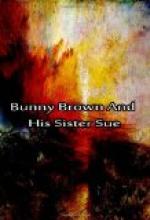Banker had not yet made the tall, narrow box, inside of which Bunny was to stand, and pretend to be Mr. Punch, but they did not need it for practice.
Bunny and Sue had told their mother they were going to have a “show” out in the barn, but they did not say what kind, nor tell why they wanted it. But they had to say something, so Mrs. Brown would let them play there, and also let them take some of their old clothes, in which to “dress-up.”
“Have as much fun as you like,” said Mrs. Brown, “but don’t slide down in any hens’ nests with eggs in them,” she added to Sue.
“I won’t, Mother.”
Bunny fixed the hollow lobster claw, with a string in a hole on either side of it, so he could tie it on his nose. Bunker bored the holes for him with a knife, and cut the claw so it would fit, and when Bunny put the queer red claw, shaped just like Mr. Punch’s nose, on his face, the little boy was so funny that all his playmates laughed.
Then, too, when Bunny talked, his voice sounded very different from what it did every day. If you will hold your nose in your hand, and talk, you will know just how Bunny’s voice sounded.
“Oh, it’s too funny!” laughed Sadie. “I know it is going to be a lovely show! Your Aunt Lu will be very much surprised.”
When Bunny practised in the barn he did not wear the lobster claw on his nose, except the first time, to see how it looked.
“It’s too hot to wear it all the while,” he said, “and it makes me want to scratch my nose, and when I do that I can’t talk. So I’ll put the claw away, and I’ll only wear it the day of the show.”
Of course Bunny and Sue could not give a Punch and Judy play like the real one, which, perhaps, you have seen. They did not have the wooden figures, like dolls, to use, and they were too small to know all the things the real Mr. Punch says and does.
But Bunny knew some of them, and really, for a little boy, he did very well. At least all his playmates said so.
In a few days Bunker Blue had the little theatre made, and as he brought it up to the Brown barn in a wagon, carefully covered over, no one could see what it was. George Watson had been asked to help, and he had made tickets for the play. The tickets, which George printed with some rubber type, read:
Fine big
show
by
Bunny brown and his sister
sue
In Their Barn
Five Pins or Five Cents To Come In
Pins Are for Children
please come
“They’re fine tickets,” said Bunny, when George showed them to him. “I hope we sell a lot.”
And several persons did buy them, paying real money for them. Bunny and the others said they were trying to help Old Miss Hollyhock, which was one reason for giving the show. The other was to make Aunt Lu feel more happy. And when the people heard what Bunny and Sue planned to do, they gladly bought one ticket, and some even more. Though not all of them would really go to the show.




